Development economists sometimes define the middle class as those making more than the bottom fifth of the population but less than the top fifth. In this country, that would include households making between $20,291 and $100,000.
Source: "Who Is in the Middle?" By EDUARDO PORTER - NY Times - November 1, 2008
The merely rich are those whose income puts them in the top 1 percent of the population. According to a recent study by the Center on Budget and Policy Priorities in Washington, the average real income for the top 1 percent of American taxpaying households was $940,000 in 2004 ó a difficult group to feel pity for. But to stand for a moment on its shores (letís pretend) and look toward the rapidly growing ranks of the superrich is to stare across a vast chasm indeed.
The superrich might be the top tenth of 1 percent (average real household income for 2004: $4.5 million) or the top hundredth (the $20-million-a-year households). Income inequality is growing fastest the higher we go up the chart. While the percentage change in average real household income between 1990 and 2004 was an increase of 2 percent for the bottom 90 percent of American households, it was 57 percent for the top 1 percent; and shot up to 85 percent for the top 0.1 percent; and up to 112 percent for the top .01 percent. That is, the richest are getting richer almost twice as fast as the rich.
Source: "A New Class War: The Haves vs. the Have Mores" By ERIC KONIGSBERG - NY Times - November 19, 2006
While Census data show about a third of American households earned between $35,000 and $75,000 a year in 2005, most Americans believe they are part of the middle class, and rare is the politician from either party who does not claim to speak for the ordinary American.
While in the past Republicans like Ronald Reagan and others have made inroads into the middle class by appealing to, for example, blue-collar conservatives, exit polls showed Democrats won middle class voters handily this year.
Fifty-eight percent of those making between $30,000 and $50,000 a year voted Democrat, compared with 41 percent who supported Republicans, and support was even stronger among the poor. In fact, Democrats won more than 50 percent support from all income groups up to $150,000, exit polls show.
Source: "Democrats Won, but Did the Middle Class?" By REUTERS (via NY Times) - November 15, 2006
In 2003, the number of Americans living in poverty rose 1.3 million to a total of 35.8 million, and the number of Americans without health insurance rose 1.4 million to a total of 44.9 million, according to the US Census Bureau.
Median household income, adjusted for inflation, stood at $43,318 in 2003, unchanged from 2002, according to the U.S. Census Bureau. And that was after two consecutive years of decline.
The percentage of households earning $25,000 to just under $75,000 -- income levels traditionally associated with those in the middle -- fell just below 45 percent last year from 46 percent in 2000. In 1978, this income bracket -- adjusted for inflation -- included just over half of all households.
During the last four years, the percentage of households earning under $25,000 has grown -- a reversal of a long-term trend. And the number of those earning more than $75,000 has remained flat. Until 2000, the percentage of upper class households was growing.
Last year [2003], almost 20 percent of households with incomes between $25,000 and $50,000 were not insured, Census Bureau figures show. That's up from 17 percent in 2000. Of those earning between $50,000 and $75,000, almost 13 percent lacked health insurance last year [2003] compared with 11 percent in 2000.
Not withstanding the lower tax rates on the middle class, a Congressional Budget Office report has found that the percentage of the total tax burden paid by the middle class has increased while the share paid by the wealthiest Americans has gone down.
[H]ourly earnings year-over-year have experienced the lowest monthly growth in 18 years.
Since 2000, the number of personal bankruptcy filings has jumped almost 30 percent. The majority of these filings come from those in the middle class.
[A]ccording to a recent report by The World Bank Group, the United States lags other industrial democracies such as Japan, Canada and Germany in terms of income equality. "I fear we are becoming a less meritocratic society and more of an old-style European system," says Nathan Berg, an assistant professor of economics at the University of Texas at Dallas who has studied income inequality.
Source: "Falling pay, rising costs have many stretched thin / Middle-class Americans feel squeeze" by Katherine Yung - Dallas Morning News - 10/3/04
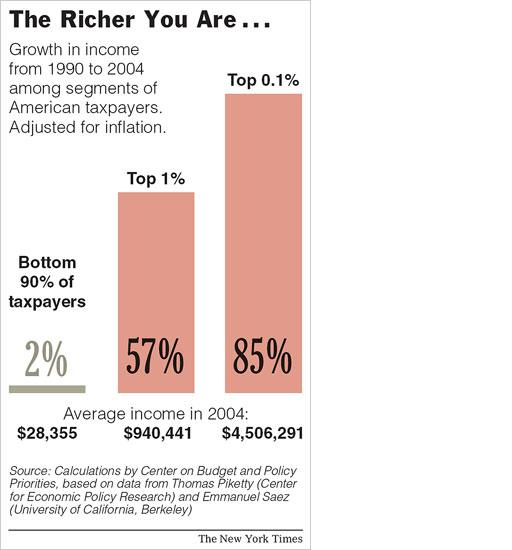
Source: NY Times - 11/20/06
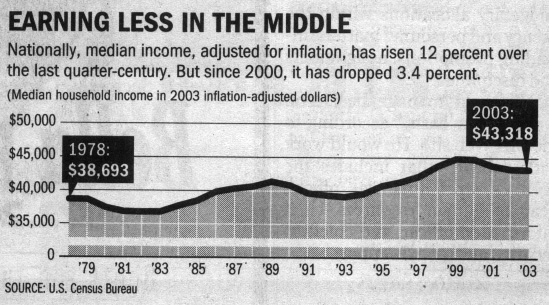
Source: Dallas Morning News - Tom Setzer
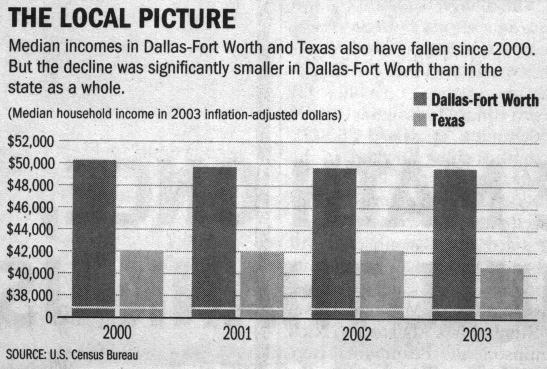
Source: Dallas Morning News - Tom Setzer
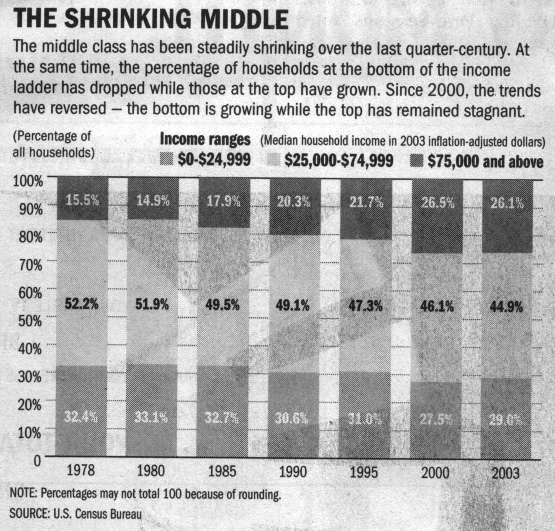
Source: Dallas Morning News - Tom Setzer
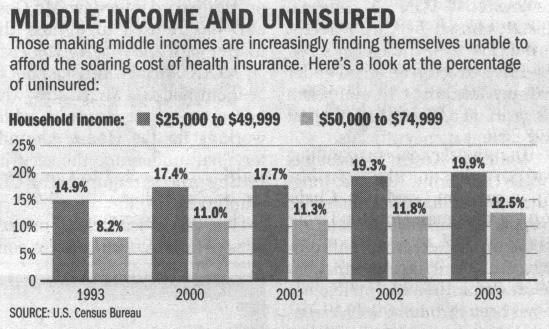
Source: Dallas Morning News - Tom Setzer
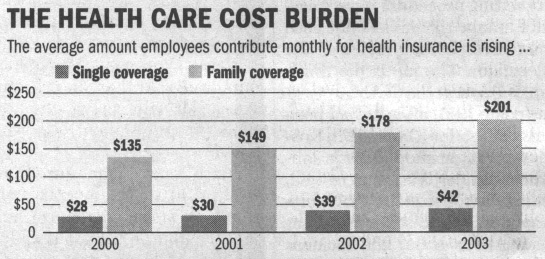
Source: Dallas Morning News - Tom Setzer
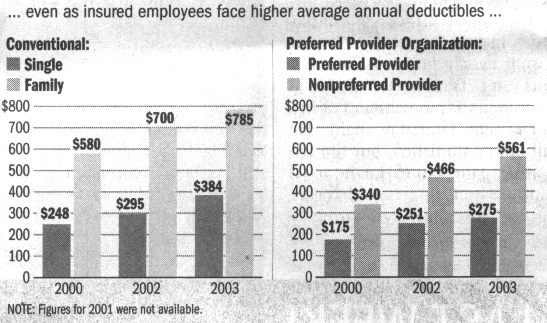
Source: Dallas Morning News - Tom Setzer
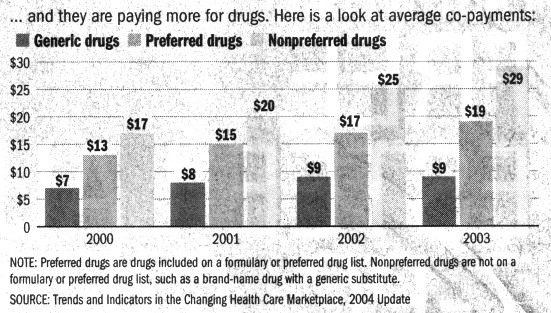
Source: Dallas Morning News - Tom Setzer
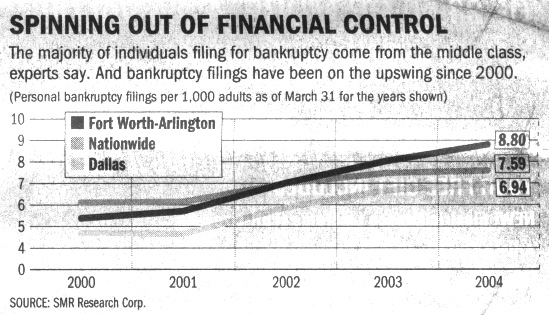
Source: Dallas Morning News - Tom Setzer
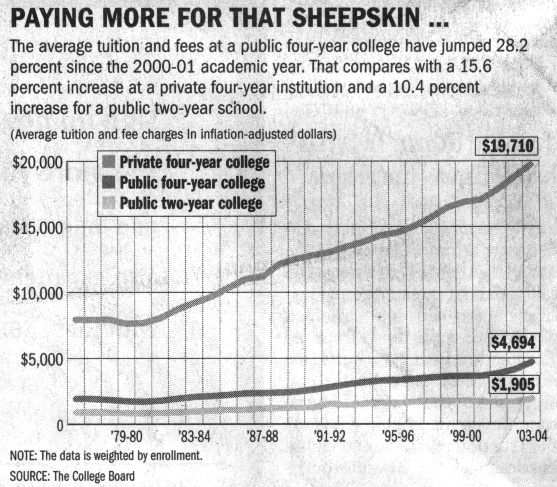
Source: Dallas Morning News - Tom Setzer
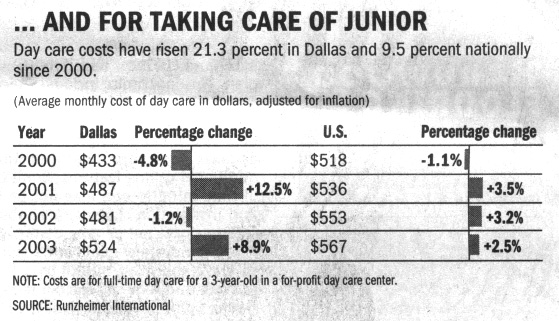
Source: Dallas Morning News - Tom Setzer
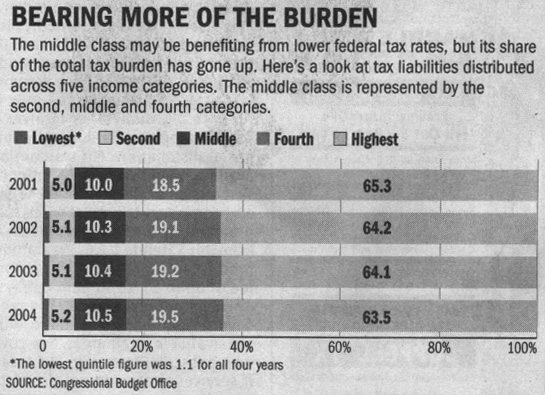
Source: Dallas Morning News - Tom Setzer